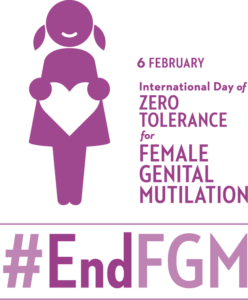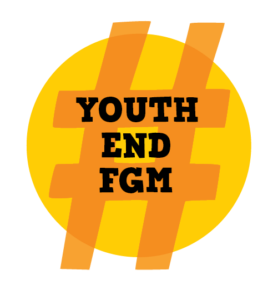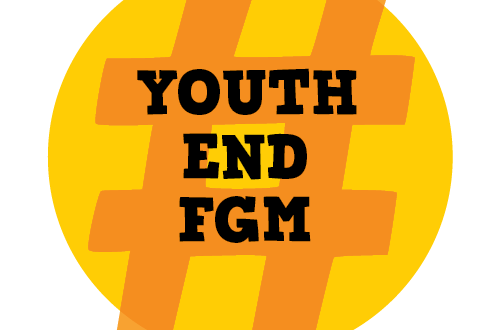The Role of Youths in Ending FGM

Background of February 6th “International Day of Zero Tolerance to FGM 2020.”
February 6th annually is a day set aside since 2012 by the United Nations General Assembly as the “International Day of Zero Tolerance for FGM”. The essence of this all important day is to amplify the awareness creation and direct efforts towards the elimination of this harmful practice by the year 2030.
International Day of Zero Tolerance to FGM 2020 Theme
Unleashing Youth Power: One decade of accelerating actions for Zero Female Genital Mutilation (FGM). If we must end FGM within the next 10 years, and then with the significant population growth coupled with the huge potentials of young people then investing in them becomes very important and indispensable. For this reason, this year’s International Day celebration is focused on mobilizing youth with the global theme: “Unleashing Youth Power: One decade of accelerating actions for Zero Female Genital Mutilation.”
The concept of FGM
Female Genital Mutilation (FGM) popularly known as Female Circumcision in many parts of the world refers to “all procedures that involve the partial or total removal of the external genitalia or any other injury to the female genital organs for non-medical reasons“ (WHO, 1997). In very simple terms, FGM refers to any attempt to remove or adjust any part of the female genital organs that changes it from the way God has created it. Although primarily concentrated in 30 countries in Africa and the Middle East, female genital mutilation is a universal problem and is also practiced in some countries in Asia and Latin America. Female genital mutilation continues to persist amongst immigrant populations living in Western Europe, North America, Australia and New Zealand. FGM is a harmful traditional practice that brings untold pain and harm to our women and girls. It has been proved that there is no single benefit derived from this practice rather it has numerous negative implications which includes: pain, severe bleeding, infections, difficulty in urinating, issues with childbirth and even death. FGM is a violence against the female body and also a serious violation of the basic human rights to health, security, integrity, dignity, and freedom of our women and girls.
The Journey So Far in Ending FGM
Although FGM has been practiced for more than a thousand years, the campaign to end the practice have also been ongoing for a long time. It is worthy of note that there has been an overall decline in the prevalence of the practice over the last three decades. Despite the high level of progress recorded so far, the practice of FGM still persists in so many quarters. Elimination of the practice is high on the international agenda, enshrined as target 5.3 of the Sustainable Development Goals (SDGs). For this reason therefore, the date for the total elimination of FGM across the globe have been set as the year 2030.
The Role of the Youth in Ending FGM
As we celebrate this year’s edition of the International Day of Zero Tolerance to FGM, it is worrisome to note that in this year 2020 alone, about 4.1 million women and girls around the world are still at risk of undergoing FGM. Whereas the practice of FGM isn’t limited to Nigeria, it is important to note that the country has the highest absolute number of FGM cases in the world according to a report by UNICEF. This underlines the fact that much more needs to be done! Good enough “Unleashing Youth Power” is at the center of our celebration for this year.

a. Empowering the Youth to End FGM
How can we really get the young people empowered and equipped to be part of the end FGM campaign? To get the youths empowered and equipped to be part of this campaign. There is need for all stakeholders involved: both the government and non-governmental organizations to leverage on Secondary schools, religious and community youth groups/associations, age grades, social clubs and then very importantly the social media as platforms to reach out to this young people, empower them with information on FGM and also inspire them to become end FGM advocates.
b. Unleashing their Youth power to End FGM
When the youths are well informed and equipped, there are several ways they can unleash their youth power to help solve the problem of FGM. First of all, all young girl between the age of 0 – 18 years who are already knowledgeable will take a decision never to submit themselves to be mutilated. Secondly, all the young girl and boys of today are the parents of tomorrow and they will have their own children. They will also take a decision never to mutilate their daughters. Thirdly, young people can engage their parents, family members and friends to help them understand FGM better and the need to abandon the practice. Again, young people should speak out when either themselves, their siblings, their friend or someone in their neighborhood is about to be subjected to FGM. Finally by signing up to the “Endcuttinggirls” Social media campaign on various social media platforms and using your own personal social media handles to share some of their contents, and as well make posts that shows your support for the total elimination of the practice. Finally, young people can become end FGM advocates in all associations and platforms where they belong to, be it in school, church, community, age grades and social clubs.
Conclusion
Time has come for all the young people out there to bring out their youthful energy to lead and scale up this campaign. As we celebrate 2020 edition of the International Day of Zero Tolerance for FGM, many thanks to every individual, group or organization that have been at the fore front of the campaign to end FGM across the globe. The complete eradication of FGM by the year 2030 is possible. Our work is to accelerate the process.
References
United Nations (2020). International Day of Zero Tolerance for FGM, 6 February
 Healthveli
Healthveli



